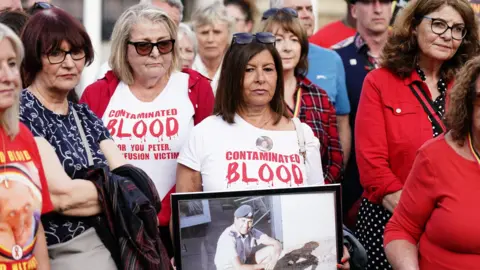More blood victims will die without compensation - minister

More victims of the infected blood scandal will die without ever receiving full compensation, a government minister has said.
The paymaster general Nick Thomas-Symonds was giving evidence to a special session of the public inquiry into what's been called the worst treatment disaster in NHS history.
It's thought 30,000 patients in the UK were infected with HIV or hepatitis B and C after being treated with a contaminated blood clotting product or given a blood transfusion in the 1970s and 80s.
Mr Thomas-Symonds agreed it was "profoundly unsatisfactory" that just 106 final compensation awards have been paid, almost a year after a damning report into the scandal was published.
"I'm never going to think this is satisfactory until everybody has received the compensation that is due," the Cabinet Office minister said.
"The objective should be absolutely to pay [people] as soon as possible."
A final report into the scandal, published last year, found that the disaster could largely have been avoided if different decisions had been taken by the health authorities at the time.
The report said too little was done to stop the importing of contaminated blood products from abroad in the 1970s and 80s, and there was evidence that elements of the scandal had been covered up.
Last month the chair of the public inquiry, Sir Brian Langstaff, ordered two days of extra hearings after he received "letter after letter, email after email" expressing concerns about the way the government's compensation scheme has been managed.
The Chancellor Rachel Reeves set aside £11.8bn in the last budget to make final awards to victims and their family members, but the latest figures show less than 1% of that total, some £97m, has been paid out to date.
Survivors of the scandal and some bereaved relatives have also received a series of smaller interim compensation payments over the last three years.
Eleven victims and their representatives gave evidence in an emotional panel session in front of an audience of around 300 people in Westminster.

Andrew Evans, chair of the campaign group Tainted Blood, told the hearing many victims and their families had been left feeling "betrayed and disappointed".
"People have given up on any expectation of receiving anything," he said.
"They have lost all hope of ever getting justice and we can't be doing this for much longer."
Other witnesses criticised the way in which individuals were being contacted and "invited" to come forward to claim final compensation, describing it as "waiting for your lottery ticket to come up".
Gary Webster, a haemophiliac who was infected with HIV and hepatitis C when a pupil at Treloar's School in Hampshire in the 1970s and 80s, said that "[some] people will not get their compensation and a lot of claims will die with them."
"It's just too slow and people won't get the justice they deserve," he added.
Under the current rules, if someone infected with HIV or hepatitis B or C dies before receiving full compensation, then any final award can be passed on to their relatives through their estate.
But compensation can also be claimed by those affected by the scandal – a partner, sibling or parent of a child, for example – for the separate impact on their lives.
And if they die before that compensation is agreed, then their claim will die with them and cannot be passed on.
In questioning later in the day, Mr Thomas-Symonds, who leads on the response for the government, said he was "restless for further progress on payments".
The Infected Blood Compensation Authority (IBCA), an independent body set up to pay victims of the scandal, has said it expects the "bulk" of awards to be made to infected survivors by the end of 2027, with most of those affected, such as family members and carers, paid by the end of 2029.
Mr Thomas-Symonds said he regarded that timeline as a "backstop" rather than a target to work towards.
"The logic for that is there may be other people who have not yet come forward at this stage [to claim]," he said.
"I've never been anything but clear they are absolute backstops and I expect these payments to speed up [in the future]."
BBC





